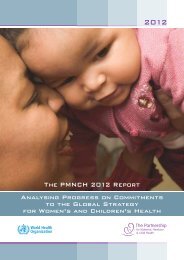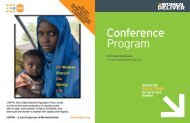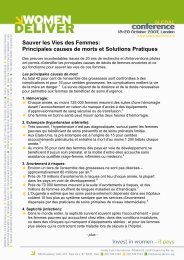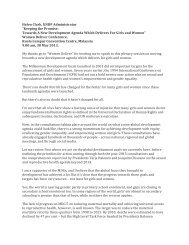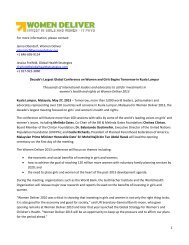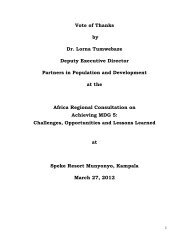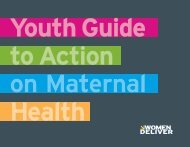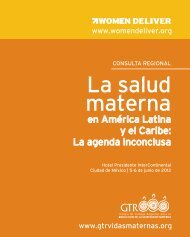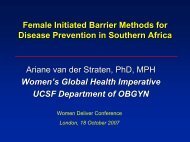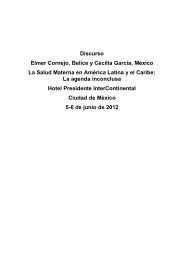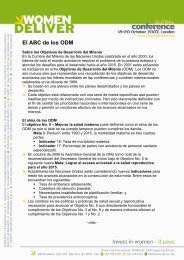childhood. It has increased in recent decades inpopulations where per capita national incomehas increased and public health activities havegrown. A study from the Laguna province <strong>of</strong>the Philippines that collected information onheights, weights and exposure to family planningprogrammes between 1975 and 1979 foundthat exposure to health programmes and familyplanning programmes improved children’sheight-for-age as well as weight-for-age. Theirestimates indicate that the height <strong>of</strong> a childfor whom no health clinic existed would be5 per cent below that for a child always exposedto a clinic, while exposure to a family planningclinic increases height by 7 per cent.Another important mechanism linkingimproved family planning services and earlychildhoodhealth is the improvement inmaternal nutrition that occurs as a result <strong>of</strong>better-spaced and fewer overall pregnancies.A vast literature in medicine, public health andthe social sciences now argues that improvedmaternal nutrition plays a critical role in childdevelopment. Many studies show that maternalunder-nutrition—as measured by stunting,wasting, chronic energy deficiencies, essentialmicronutrient deficiencies and body massindexes below 18.5 are associated with increasedrisk <strong>of</strong> intrauterine growth retardation as well ascomplications at birth and birth defects (Bhuttaet al., 2008). Poor foetal growth can contributeindirectly to neonatal deaths, particularly thosedue to birth asphyxia and infections (sepsis,pneumonia, and diarrhoea), which togetheraccount for more than half <strong>of</strong> neonatal deathsin the world today.Declines in fertility and improvements inmaternal health are known to be associated withhealthier babies with higher birth weights andlower risks <strong>of</strong> neonatal death. This was seen incommunity-sampled prospective birth cohortsin Nepal, India, Pakistan and Brazil. The studyfound that infants born at term weighing 1500–1999 grams were 8.1 times more likely to die,while those weighing 2000–2499 grams were2.8 times more likely to die from all causesduring the neonatal period than were thoseweighing more than 2499 grams at birth(Bhutta et al., 2008).Children’s schoolingImproved reproductive health and access to familyplanning can also affect investment in humancapital in children. This occurs through severalchannels. Increases in life expectancy create newincentives and opportunities for investmentsin schooling. Moreover, improved reproductivehealth improves overall health <strong>of</strong> mothers duringpregnancy, which has favourable impacts on children’scognitive development. Finally, declinesin fertility free up women’s resources and allowthem to increase investments in schooling fortheir children.The best evidence for the relationship betweenfertility decline, improved reproductive healthand children’s schooling again comes fromMatlab, Bangladesh. Declines in fertility andimproved maternal health not only increasedinvestment in the schooling <strong>of</strong> children butalso impacted the trade-<strong>of</strong>fs between children’sschooling and labour (Sinha, 2003; Joshi andSchultz, 2007; Schultz, 2010). There is alsoevidence that the programme also positivelyimpacted children’s test scores and cognitivedevelopment (Barham, 2009).Children’s future labour force participationDeclines in a mother’s fertility, improvements inher health and greater investments in children’shuman capital should ultimately impact theirparticipation in the labour force. While thislink is intuitive and appears to be obvious,78 CHAPTER 4: THE SOCIAL AND ECONOMIC IMPACT OF FAMILY PLANNING
empirical evidence supporting this theory hasso far proved to be elusive, largely because <strong>of</strong> thelong time lags between the times that these outcomesare observed.Further evidence in support <strong>of</strong> the relationshipbetween mother’s health, a child’s health and hisor her participation in the labour force comesfrom the studies <strong>of</strong> maternal nutrition. Thesestudies demonstrate that declines in fertility andimprovements in maternal health are associatedwith not only improved child health, improvedcognitive test scores and schooling attainmentbut also improved occupational status and earnings,reduced non-participation in the labourforce, reduced chronic disease and disabilitybefore the age <strong>of</strong> 50, and more notably thereafter(Miguel and Kremer, 2004; Almond 2006;Almond, Edlund, et al., 2007; Almond andMazumder, 2008; Almond and Currie, 2011).One recent study used data on monozygotictwins to estimate the effect <strong>of</strong> intrauterinenutrient intake on adult health and earningsfound that health conditions play a majorrole in determining the world distribution <strong>of</strong>income (Behrman and Rosenzweig, 2004).The study showed considerable variation in theincidence <strong>of</strong> low birth weight across countries,and that there are real pay<strong>of</strong>fs to increasingbody weight at birth. Increasing birth weightincreases adult schooling attainment and adultheight for babies at most levels <strong>of</strong> birth weight.They also find evidence that augmenting birthweight among lower-birth weight babies, butnot among higher-birth weight babies, hassignificant labour market pay<strong>of</strong>fs.Reproductive health and the wealth andwell-being <strong>of</strong> householdsThere are several routes through which fertilitydecline and improved health may be translatedinto better household social and economicwell-being (Bloom and Canning, 2000;Birdsall, Kelley and Sinding, 2001; Schultz,2008; Sinding, 2009). First, as documentedearlier, healthier people work more and arephysically and cognitively stronger, and, thusmore productive and earn higher incomesand accumulate more assets. Second, healthierpeople enjoy a longer life expectancy, and thushave greater opportunities to invest in, andreap returns from, their schooling and humancapital more broadly. This positive relationshipbetween health and wealth is further reinforcedby low fertility and the quantity-qualitytMobile health clinic inSri Lanka.©<strong>UNFPA</strong>/FPASLTHE STATE OF WORLD POPULATION <strong>2012</strong>79
- Page 6 and 7:
OverviewOne hundred seventy-nine go
- Page 8 and 9:
The report is structured to answer
- Page 10 and 11:
viiiCHAPTER 1: THE RIGHT TO FAMILY
- Page 12 and 13:
“All human beings are born free a
- Page 14 and 15:
Treaties, conventions and agreement
- Page 16 and 17:
Health: a social and economic right
- Page 18:
“Everyone has the right to educat
- Page 21 and 22:
designing and delivering accessible
- Page 23 and 24:
use, and reduces unintended pregnan
- Page 26 and 27:
16 CHAPTER 2: ANALYSING DATA AND TR
- Page 28 and 29:
Change in Age-Specific Fertility Ra
- Page 30 and 31:
Sexuality, sexual and gender stereo
- Page 32 and 33:
not necessarily associated with a d
- Page 34 and 35:
METHOD EFFECTIVENESSMethod, rankedf
- Page 36 and 37:
tCouple visiting a ruralfamily plan
- Page 38: Demand and supply over time5 per ce
- Page 41 and 42: contribute to high unmet need (Sing
- Page 43 and 44: abortions in the region lead to mor
- Page 45 and 46: (as stated in the Convention on the
- Page 47 and 48: arriers prevent individuals from ac
- Page 49 and 50: CHAPTERTHREEChallenges in extending
- Page 51 and 52: sources of sexual and reproductive
- Page 53 and 54: messages were delivered via a numbe
- Page 55 and 56: Ricardo, 2005). Moreover, young and
- Page 58 and 59: per cent in Guatemala. Across all c
- Page 60 and 61: tTeenager inMadagascar listens toa
- Page 62 and 63: Consensual unions account for an in
- Page 64 and 65: when. The proportion of never-marri
- Page 66 and 67: 63 per cent to 93 per cent of young
- Page 68 and 69: Family planning in humanitariansett
- Page 71 and 72: Studies suggest that HIV may have a
- Page 73 and 74: with a public health challenge (Wor
- Page 75 and 76: State-run family planning programme
- Page 77 and 78: people in mobile, temporary, and re
- Page 79 and 80: systems and civic participation to
- Page 81 and 82: CHAPTERFOURThe social and economici
- Page 83 and 84: tCommunityeducation inCaracas, Vene
- Page 85 and 86: Estimates of Total Fertility2010-20
- Page 87: children, and healthier women also
- Page 92 and 93: tRicardo and Sarain Mexico City say
- Page 94 and 95: to secure the future population’s
- Page 96 and 97: 86 CHAPTER 5: THE COSTS AND SAVINGS
- Page 98 and 99: Unintended Pregnancies and outcomes
- Page 100 and 101: tDonor Commitmentspanel at the Lond
- Page 102 and 103: UNFPA supports the Health for All c
- Page 104 and 105: tDr. BabatundeOsotimehin, Executive
- Page 106 and 107: 96 CHAPTER 6: MAKING THE RIGHT TO F
- Page 108 and 109: When individuals are able to exerci
- Page 110 and 111: Family planning programmes must ref
- Page 112 and 113: Family planning programmes reinforc
- Page 114: tPresident of NigeriaGoodluck Jonat
- Page 117 and 118: Monitoring Monitoring ICPD ICPD Goa
- Page 119 and 120: Monitoring Monitoring ICPD ICPD Goa
- Page 121 and 122: Monitoring Monitoring ICPD ICPD Goa
- Page 123 and 124: Monitoring ICPD Goals Demographic -
- Page 125 and 126: Monitoring ICPD Goals - Selected In
- Page 127 and 128: BibliographyAbbasi-Shavazi, Mohamma
- Page 129 and 130: Monitoring ICPD Goals - Selected In
- Page 131 and 132: Monitoring ICPD Goals - Selected In
- Page 133 and 134: Monitoring ICPD Goals - Selected In
- Page 135 and 136: Monitoring ICPD Goals - Selected In
- Page 137 and 138: Monitoring ICPD Goals - Selected In
- Page 140:
Delivering a world where every preg




